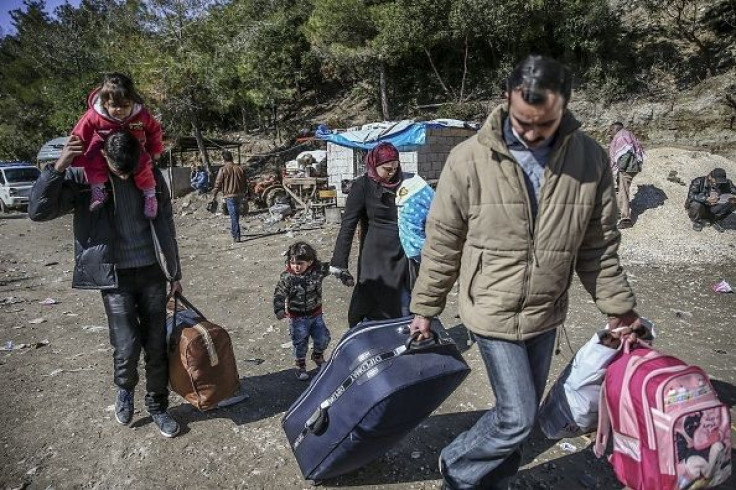EU To Pitch Refugee Plan To Turkey

European Union leaders will try to convince Turkey's prime minister to help end Europe's migration crisis in return for financial and political concessions but they remain unsure if Friday's Brussels summit can clinch a deal.
"Tomorrow's negotiations with Turkey won't be very easy," said German Chancellor Angela Merkel, who devised the outlines of the plan with Turkish Prime Minister Ahmet Davutoglu, after EU leaders agreed a common stance on Thursday.
"We're on the right track but we're not there yet," French President Francois Hollande told reporters after the first day of talks in Brussels. "I can't guarantee you a happy ending."
Even if they can overcome possible Turkish objections, Thursday's EU discussions revealed considerable doubts among the Europeans themselves over whether the deal can be made either legal in international law, or workable.
During dinner talks, leaders gave EU negotiators a mandate to conclude an accord with Turkey by which it would take back all migrants who reach Greek islands off its coast. In return the EU would take in Syrian refugees direct from Turkey, increase aid for Syrians there, speed Ankara's EU membership process and a scheme to let Turks visit Europe without visas.
Much of the debate, Merkel said, focused on ensuring that a plan which has outraged human rights agencies could ensure that those returned to Turkey, a country with a patchy and worsening record on the matter, would have rights to asylum protected.
"An agreement with Turkey cannot be a blank check," Belgian Prime Minister Charles Michel warned, echoing many colleagues who face complaints that Europe is selling out to anti-immigrant nationalists at home by outsourcing its problems to the Turks.
Right outside the summit center, rights group Amnesty International had planted a large screen in the middle of Brussels' European district proclaiming "Don't trade refugees. Stop the deal."
Summit chairman Donald Tusk will begin negotiations with Davutoglu at 8:30 a.m. local time to prepare for a lunch meeting at which all 28 EU national leaders aim to wrap up a deal with the Turkish premier.
A major problem is Turkey's four-decade-old dispute with EU member Cyprus, whose President Nicos Anastasiades insisted there could be no speeding up of Turkey's EU membership talks until Ankara stops barring Cypriot traffic from its sea and airports - itself a result of a refusal to recognize the Cypriot state.
Following the EU meeting, at which leaders highlighted to Tusk where they could give ground and where they had "red lines", Anastasiades he was ready to veto a deal if he had to.
There is anger in Nicosia at Merkel for appearing to make Davutoglu an offer without having consulted Cyprus at a time when talks on reunification with the Turkish-backed north of the island are at a delicately hopeful stage. Tusk, a former Polish premier, made clear Cypriot interests must be respected.
DESPERATION
After a year in which more than a million people have arrived in Europe fleeing war and poverty in the Middle East and beyond, EU countries are looking desperately to Turkey to seal its coastline and stem the flow.
One senior EU official said that a lack of legal clarity in Turkey on the status of refugees from countries other than Syria - notably large numbers of Iraqis and Afghans - was a serious sticking point to Greece sending such people back.
Prime Minister Alexis Tsipras, facing a build-up of more than 40,000 refugees stranded in Greece by recent border closures in the Balkans, said his economically struggling country needed more help to care for migrants.
EU officials said Greece also needed time to set up legal and administrative structures to carry out the deportations and grant migrants individual asylum and appeal hearings.
Davutoglu said as he left Ankara for Brussels that EU states were struggling to agree among themselves but that he would not take a deal to "turn Turkey into an open prison for migrants".
Diplomats said talks among the EU states had watered down inducements to Turkey and included new safeguards intended to overcome legal objections to sending back migrants.
Ankara's central objective - visa-free travel for Turks to Europe by June - will depend on Turkey meeting a raft of long-standing EU criteria. With French voters alarmed at the idea of 75 million Muslim Turks free to travel, Hollande stressed the need to fulfill all 72 prior conditions.
The draft, seen by Reuters, says the aim is "to break the business model of the (people) smugglers" and to offer migrants an alternative to putting their lives at risk. It stresses the return is "a temporary and extraordinary measure which is necessary to end the human suffering and restore public order".
Leaders set no date to start the scheme. Some want all those arriving on Greek beaches from next Monday to be held for deportation, but Athens says it needs weeks to prepare. Yet such delay may trigger a rush to cross before Europe shuts down -- Merkel said any hold-up would create a "pull factor".
She also said Europe must be ready to start resettling legal Syrian refugees directly from Turkey within days of the start of migrant returns from Greece.
© Copyright Thomson Reuters 2024. All rights reserved.











